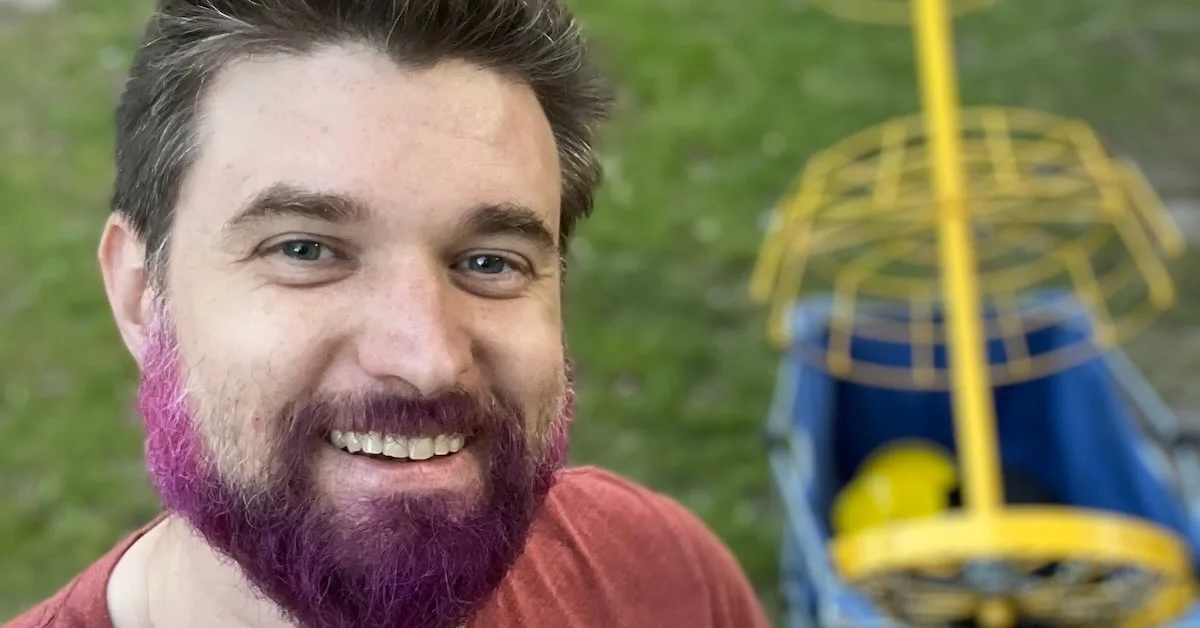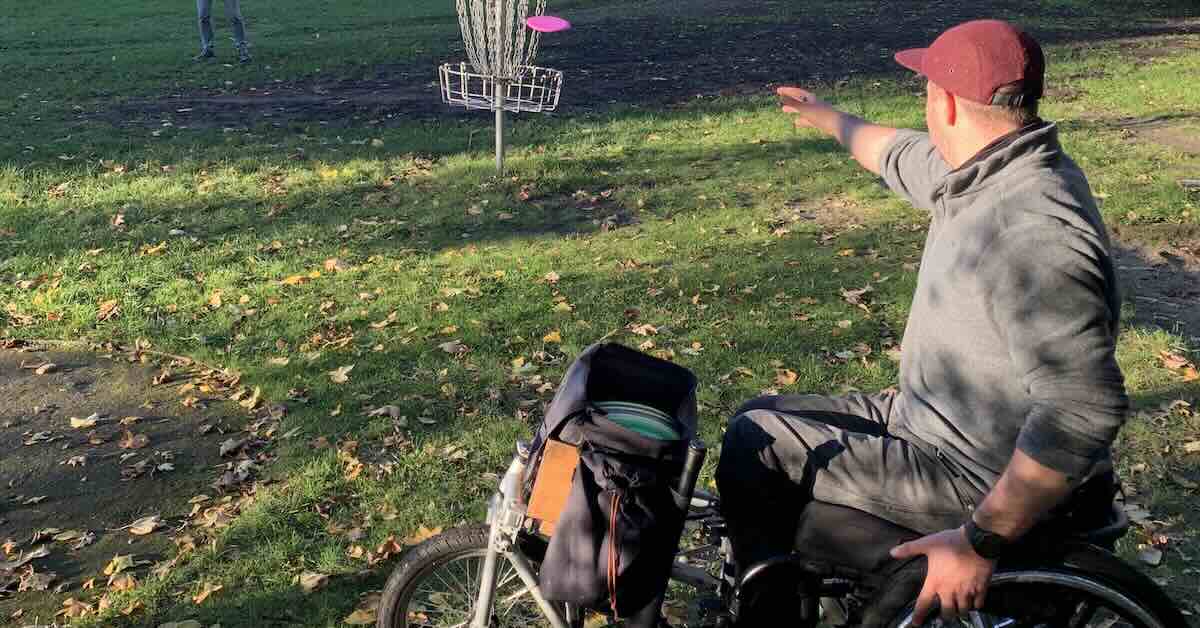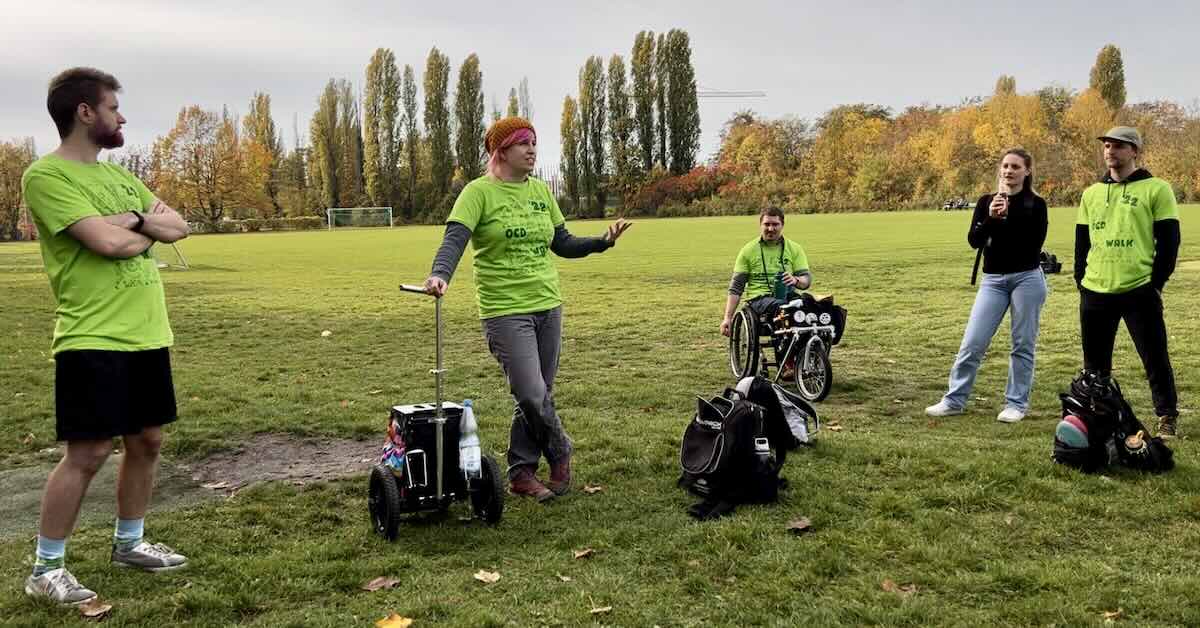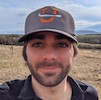Andrew GottWorth said after he and his wife got interested in moving to Europe from Kentucky, his partner used a simple method to compare possible new homes.
"She literally made a pro/con spreadsheet of London, Paris, Berlin, Amsterdam, and a few others, and we decided to make a big jump," GottWorth said.
Berlin, the capital of Germany, won out. And shortly after the two arrived, GottWorth found his way into the disc golf division of a Berlin sports club called Pfeffersport.
One of Pfeffersport's missions is inclusion. When GottWorth saw them following through on that mission in the form of events and activities aimed squarely at groups sport often excludes (e.g., those in wheelchairs, the very young, seniors, etc.), he felt inspired.

Helped by Pfeffersport's Johannes Kropf, GottWorth decided to create a disc golf event series that would support people facing mental health struggles and educate those who don't about what such struggles are really like. It's a cause close to his heart. Diagnosed with depression over a decade ago and with obsessive-compulsive disorder (OCD) and ADHD within the last seven years, GottWorth has long volunteered with organizations that help those whose mental health, like his own, requires constant, conscious management.
So far Mental Health Disc Golf events have been held in Dublin, Ireland; Vienna, Austria; and Berlin. While attendance has been modest, the results for participants have been significant – and interest appears to be growing considering the multiple requests GottWorth has received to run more events in other countries.
We talked with GottWorth and Bob van Rugge of the Dublin Disc Golf Club to learn more about how the events are organized, what players have gotten out of them, and plans for Mental Health Disc Golf events in the future.
How Does a Mental Health Disc Golf Event Work?
GottWorth told us that Mental Health Disc Golf events have two main goals.
"One is for disc golfers who may or may not have mental health disorders to learn more about it, start to appreciate what disc golf can bring, and maybe start discussions that break down stigma around mental health disorders," GottWorth said. "The other side is people with mental health disorders who may or may not know disc golf to come into it and maybe find a tool that can help them and then have a space that is stigma-reduced with people talking about mental health – a safer space."
Engaging in any sort of play is good for mental and cognitive health no matter your age, but disc golf lends itself particularly well to GottWorth's aims. Typically played at a leisurely pace and in areas big enough to allow groups to spread out, disc golf allows time and space for intimate conversation. Another bonus is that disc golf doesn't require players to directly oppose others like when you block a shot in basketball or get someone out in baseball. This reduces the likelihood of adversarial feelings occurring between players and tainting discussions.

Players at Mental Health Disc Golf Events take on the course in a doubles format with two nine-hole rounds. Instead of the typical two-team, four-person playing groups, though, GottWorth puts three teams (six total players) to a card.
"It moves slower but it has bigger discussion," GottWorth explained. "You can really have a variety of comments. People can speak up if they want to and also sort of wait and not have to speak if they're not comfortable. It also builds community."
Of course, GottWorth doesn't just send groups out with a general mandate to discuss mental health while they play. He prepares facts and questions designed to catalyze discussion, and one gets read out at the beginning of each hole. One player in each group is a facilitator who gets these discussions started and greases the wheels of conversation if necessary.
Because the events focus on a weighty topic, it's also important to include elements that lighten things up a bit.
"We've had prizes like closest-to-the-pin and longest drive," GottWorth said. "Just trying to have some fun because mental health discussions can be quite heavy."
So far all events have been free to play with a suggested minimum donation that's given to a local organization dedicated to mental health.
Results from Mental Health Disc Golf Events So Far
Van Rugge, head of the Dublin Disc Golf Club and designer of Dublin's sole disc golf course in Corkagh Park, helped facilitate a Mental Health Disc Golf event and was impressed with the outcomes.
"Andrew prepared some really insightful and thought-provoking questions to help guide the conversation during the round," van Rugge said. "Mental health can sometimes be quite difficult to talk about, especially with strangers, but by asking questions that bridge mental health struggles with disc golf struggles and the insights that can help us understand or grow in either or both of these facets of life really made us realize the extent of our own knowledge and understanding of many of the mental health struggles that Andrew was hoping to bring to the fore."

GottWorth is always considering ways to maximize the benefits van Rugge pointed out. For one, he's noticed that playing a full 18 holes mixed with all the discussion can leave some participants drained – particularly beginner disc golfers not quite ready to spend most of their day out on the course.
"It's really pitched as casual best-shot doubles that can be for beginners," GottWorth said. "In Dublin we thankfully had quite a few beginners and I think 18 holes was a little much."
But even if the amount of disc golf could use a bit of scaling back for this context, van Rugge believes the events perfectly showcase why disc golf can be such a powerful addition to anyone's mental health toolkit.
"I think what's really critical is not only the mental health that was spoken about during the event but the reminder that disc golf can be used as a mental health tool as well," van Rugge said. "Sometimes if we're feeling down, frustrated, anxious, or anything else, coming to the course and playing a round can really go a long way in helping center ourselves and contextualizing the problems or struggles we may face."
The Future of Mental Health Disc Golf Events
Mental Health Disc Golf will certainly return to Dublin in 2026, and three events are already scheduled for November 2025 in Mansfield, England (11/9); Lubón, Poland (11/23); and Berlin (11/29) – click or tap on a place to see more details about the get-togethers on UDisc Events.
GottWorth said there's even talk about traveling to Australia to run multiple events around the country though that's something of a stretch goal at the moment.
He's excited about the growing interest in the event format and the positive reception from participants so far, and he's happy to help others organize something similar – or for his ideas to be put to good use without any input from his side.
"Yes, I have fun doing this, and I'd love to be involved," GottWorth said. "But it's not about me. Anyone can take this idea and run with it – if they want to have discussion questions or just focus on the community and nature, go for it. They can absolutely steal it – no problem."
